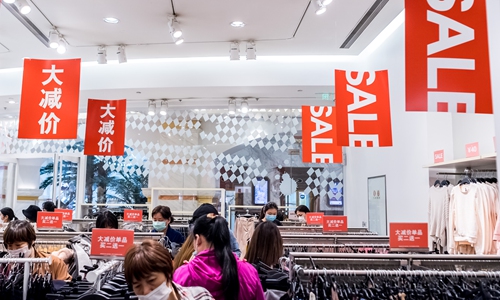Chinese exporters shift to domestic market to withstand coronavirus crisis
Source:Global Times Published: 2020/7/2 22:53:40

People shop in a mall in Shanghai on Saturday as the city gears up to promote consumption. It plans to hold a shopping festival on May 5 amid the COVID-19 pandemic. There will be big discounts online and at physical stores. Alibaba said discounts it offers will help Shanghai consumers save about 2 billion yuan ($282 million) during the festival. Photo: IC
Facing the coronavirus crisis, Chinese exporters are racking their brains for solutions. One method they are trying is shifting to domestic customers with the help of supportive policies provided by the government as well as large online platforms.
More than 40,000 Chinese trade companies have opened shops on Alibaba's retail platform 1688.com to cater to domestic customers since April 7, when Alibaba launched its
"Chunlei plan" to help smaller companies pull through the pandemic crisis.
At least 360,000 Chinese exporters are seeking to shift to the domestic market via the platform due to the worsening overseas trade environment, according to 1688.com data.
The business shift has come at a time when many domestic trade companies have been struggling with shrinking foreign demand as a result of coronavirus disruptions and have been searching for solutions to weather the crisis.
Success is not guaranteed for every company, but some have seen their burden relieved because of the strategy.
He Fei, head of Wenzhou-based shoe maker Yiwanda Shoes, said that the company's domestic sales revenue has exceeded 10 million yuan ($1.416 million) since the company opened a shop on alibaba.com in March.
This helped offset, to some extent, the losses arising from plunging foreign orders for the shoe maker. This year, the company's revenue from foreign orders slumped by about 30 percent, as the pandemic hit some of its largest customers including clients in Russia and the Middle East.
"We want to make this (exploration of the domestic market) a long-term strategy instead of a transitional response plan," he said, while adding that domestic sales can't totally make up for the fall in export sales.
A sales manager surnamed Hu from a Shaoxing-based curtain maker also told the Global Times that the company is training some employees to try selling products on domestic livestreaming platforms after foreign orders slumped by about 30 percent this year.
"The most difficult thing we feel in such a transition is how to nurture new customers, which takes a lot of time," Hu told the Global Times.
Wang Hai, vice president of Alibaba Group, said that it might be harder for some product categories to make the transition. "For example, some factories who used to export party goods to overseas markets might not be able to develop local customers that fast, as China lacks the same party culture," he told the Global Times.
But at the same time, some domestic OEMs that make things for well-known international household product brands can shift to the domestic market more easily, as Chinese customers have already been "educated" about the quality of such products.
On the other hand, the Chinese government and domestic online platforms have also taken measures to help domestic companies pull through the coronavirus. According to guidelines launched by the State Council recently, China has launched a series of policies to help Chinese trade companies shift from exporting to selling to domestic customers.
The policies include encouraging companies to produce goods with the same quality for export and domestic sales, enhancing protection of intellectual property rights and establishing platforms to help with the market shift.
Alibaba.com also launched a basket of measures to help exporters shift to the domestic market, such as granting 9 billion yuan worth of low-interest loans to foreign companies, rolling out logistics solutions to help companies reduce costs and providing training courses.
Posted in: ECONOMY